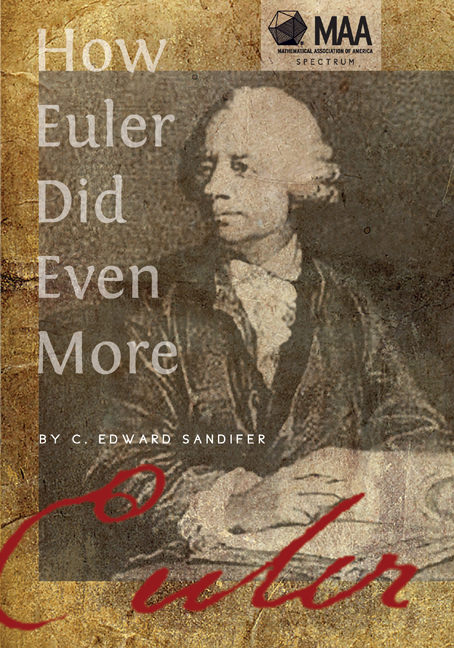Book contents
- Frontmatter
- Contents
- Preface
- Part I Geometry
- 1 The Euler Line (January 2009)
- 2 A Forgotten Fermat Problem (December 2008)
- 3 A Product of Secants (May 2008)
- 4 Curves and Paradox (October 2008)
- 5 Did Euler Prove Cramer's Rule? (November 2009—A Guest Column by Rob Bradley)
- Part II Number Theory
- Part III Combinatorics
- Part IV Analysis
- Part V Applied Mathematics
- Part VI Euleriana
- About the Author
1 - The Euler Line (January 2009)
from Part I - Geometry
- Frontmatter
- Contents
- Preface
- Part I Geometry
- 1 The Euler Line (January 2009)
- 2 A Forgotten Fermat Problem (December 2008)
- 3 A Product of Secants (May 2008)
- 4 Curves and Paradox (October 2008)
- 5 Did Euler Prove Cramer's Rule? (November 2009—A Guest Column by Rob Bradley)
- Part II Number Theory
- Part III Combinatorics
- Part IV Analysis
- Part V Applied Mathematics
- Part VI Euleriana
- About the Author
Summary
A hundred years ago, if you'd asked people why Leonhard Euler was famous, those who had an answer would very likely have mentioned his discovery of the Euler line, the remarkable property that the orthocenter, the center of gravity and the circumcenter of a triangle are collinear. But times change, and so do fashions and the standards by which we interpret history.
At the end of the 19th century, triangle geometry was regarded as one of the crowning achievements of mathematics, and the Euler line was one of its finest jewels. Mathematicians who neglected triangle geometry to study exotic new fields like logic, abstract algebra or topology were taking brave risks to their professional careers. Now it would be the aspiring triangle geometer taking the risks.
Still, the late H. S. M. Coxeter made a long and distinguished career without straying far from the world of triangles, and he introduced hundreds of others to their delightful properties, especially the Euler line. This month, we look at how Euler discovered the Euler line and what he was trying to do when he discovered it. We will find that the discovery was rather incidental to the problem he was trying to solve, and that the problem itself was otherwise rather unimportant.
This brings us to the 325th paper in Gustav Eneström's index of Euler's published work, “Solutio facilis problematum quorumdam geometricorum difficillimorum” (An easy solution to a very difficult problem in geometry) [E325]. Euler wrote the paper in 1763 when he lived in Berlin and worked at the academy of Frederick the Great. The Seven Years War, which extended from 1756 to 1763, was just ending. Late in the war, Berlin had been occupied by foreign troops. Euler and the other academicians had lived the last years in fear for their own safety and that of their families, but a dramatic turn of events enabled Frederic to snatch victory from the jaws of defeat and win the war. When he returned to Berlin, he tried to manage his Academy of Sciences the same way he had managed his troops. In just three years, he had completely alienated Euler and Euler left for St. Petersburg, Russia to work at the academy of Catherine the Great. The paper was published in 1767 in the journal of the St. Petersburg Academy.
- Type
- Chapter
- Information
- How Euler Did Even More , pp. 3 - 9Publisher: Mathematical Association of AmericaPrint publication year: 2014



